We’re quarantined. And if you’re anything like us, that means you’re snacking all day, every day (the kitchen is right there) and trying to find new ways to stay healthy. Why not hit two birds with one stone? That’s where CHOMPS comes in. CHOMPS has changed the ethical game in the meat snack industry and has partnered with influencers to do so.
Listen in to hear how family-owned CHOMPS uses always-on influencer partners to drive brand awareness and showcases their dedication to clean sourcing and raising industry-wide standards for meat snacks through their influencer programs.
Key Takeaways:
- Influencer marketing won’t work in a silo: influencer programs should closely tie with other marketing initiatives.
- Influencers that come to you are a great headstart in finding long term, impactful influencer partners because they are the ones who truly believe in your mission.
- During the crisis, allow the influencers to adjust your messages. They know their audience best and will help ensure your brand is relevant and useful and in sync with the times.
Interview with CHOMPS
Perlu: Hello and welcome to the Perlu Podcast: Influencer Marketing Reimagined. In this episode, we’re going to hear from Pete Maldonado, CEO and cofounder of CHOMPS. We’ll also be hearing from Jodie Lyons, the director of marketing partnerships. Pete started the CHOMPS business from his apartment in 2012. Today, the better-for-you meat snack brand is one of the fastest growing in the country, available online and at retailers nationally.
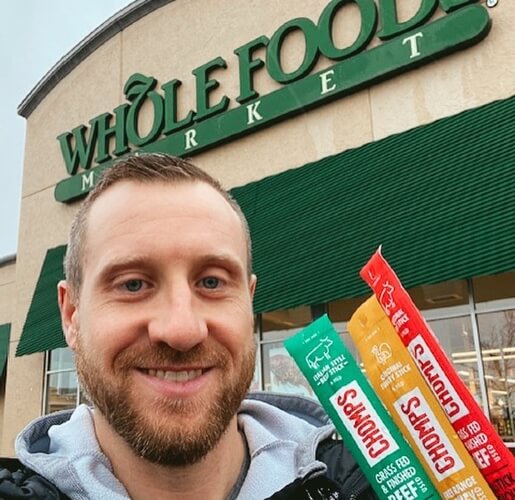 CHOMPS has raised the bar for taste, quality standards and consumer loyalty in meat snacks, a $2.5 billion category that enjoys strong sales growth and has evolved significantly since the days of iconic brands like Slim Jim. Since the beginning, the brand’s dedication to clean sourcing and producing the highest quality meat and poultry available has helped raise industry-wide standards for meat snacks. And seven years after starting the company as a direct-to-consumer e-commerce brand, consumers today can find CHOMPS in leading natural food stores, mainstream groceries and convenience stores across the country.
CHOMPS has raised the bar for taste, quality standards and consumer loyalty in meat snacks, a $2.5 billion category that enjoys strong sales growth and has evolved significantly since the days of iconic brands like Slim Jim. Since the beginning, the brand’s dedication to clean sourcing and producing the highest quality meat and poultry available has helped raise industry-wide standards for meat snacks. And seven years after starting the company as a direct-to-consumer e-commerce brand, consumers today can find CHOMPS in leading natural food stores, mainstream groceries and convenience stores across the country.
CHOMPS is redefining a food category and the art of good snacking and supporting the movement toward healthier food options with strategic partners like Whole30 and O2.
Jodie Lyons leads marketing partnerships at CHOMPS, where she manages influencer activations, affiliate programming and strategic brand partnerships. Prior to joining CHOMPS, Jodie worked at Edelman on the influencer marketing team, where she executed influencer initiatives for a variety of CPG clients.
I’m your host, Alexis Trammell, and if you enjoy today’s episode, we hope you sign up for Perlu to learn more about how you can grow your influencer marketing career. Thank you both so much for joining us today, Jodie and Pete.
Jodie Lyons: So excited to be here.
Pete Maldonado: Same here. Thank you for having us.
Perlu: Awesome. Thank you guys. I know it’s a crazy time out there in the world with COVID and everything going on, so I can’t tell you how much I appreciate you joining me for a podcast straight from your living rooms.
Tell us a little bit more about yourselves and what your day to day currently looks like at this time.
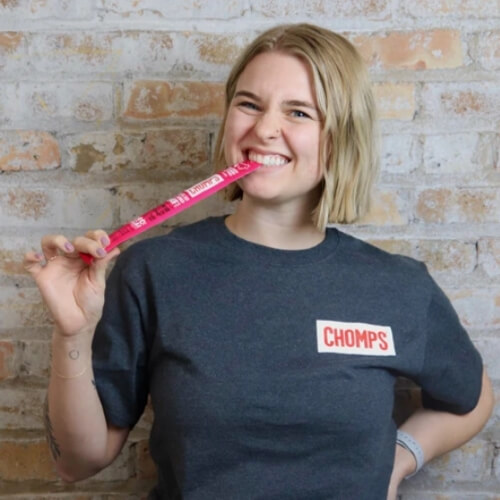 Jodie Lyons: I lead marketing partnerships at CHOMPS, including influencers which takes up a big part of my day to day. I also head up our brand partnerships and our affiliate programming. My days truly do look different every single day, especially right now. I don’t think anybody’s day looks like it normally does right now, but I am constantly working with influencers through various networks or relationships that we manage directly. I also collaborate with a lot of awesome like-minded brands in the CPG space and put together really fun partnerships that way. I lead affiliate marketing too, which works closely in line with our influencer programming. I have my hand in a lot of different things, influencer being a really big part of my day.
Jodie Lyons: I lead marketing partnerships at CHOMPS, including influencers which takes up a big part of my day to day. I also head up our brand partnerships and our affiliate programming. My days truly do look different every single day, especially right now. I don’t think anybody’s day looks like it normally does right now, but I am constantly working with influencers through various networks or relationships that we manage directly. I also collaborate with a lot of awesome like-minded brands in the CPG space and put together really fun partnerships that way. I lead affiliate marketing too, which works closely in line with our influencer programming. I have my hand in a lot of different things, influencer being a really big part of my day.
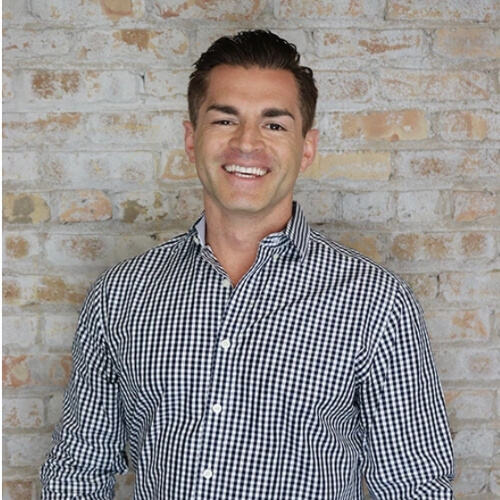 Pete Maldonado: I’m the CEO of CHOMPS and I oversee everything sales and marketing. We have a COO, our co-founder Rashid, and he handles everything operations and finance. And so I stay in my lane with sales and marketing.
Pete Maldonado: I’m the CEO of CHOMPS and I oversee everything sales and marketing. We have a COO, our co-founder Rashid, and he handles everything operations and finance. And so I stay in my lane with sales and marketing.
Perlu: Awesome. The more fun job anyway, right?
Pete Maldonado: That’s right!
Perlu: How do influencers typically fit into CHOMPS’ marketing strategies?
Jodie Lyons: We have a pretty built-out marketing team at CHOMPS, and we all work really closely together to make sure that all of our marketing initiatives feel well rounded, connected and cohesive. Influencer marketing doesn’t live in its own little tunnel. We work to make sure that all of our influencer programming ties directly back to other marketing initiatives that we have going on across the board, whether that be a certain message or program or larger creative idea that our marketing team is leading at a given time or whether it’s based on a new product or seasonality. As a whole team, we also have more evergreen efforts that bring new customers to the brand.
We’re talking about CHOMPS and building brand awareness, so all of that influences the programming I’m building with our influencers. We execute a pretty wide 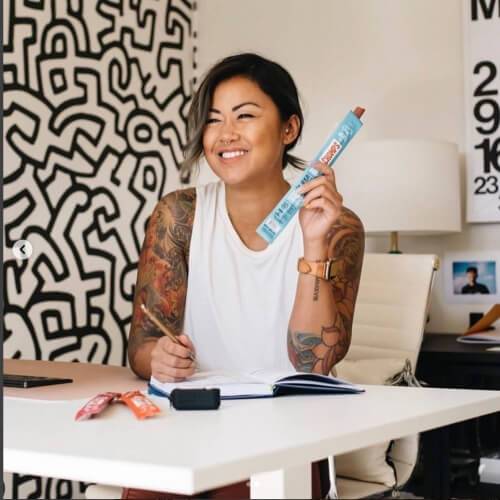 variety of different influencer strategies, like our evergreen programming that is really meant to build trust and bring people to the brand through long-term partners. Some of them have been with us since the early days of CHOMPS. A lot of those partners have been with us a year or more, and we work with them consistently because they’re great at building trust with their audience.
variety of different influencer strategies, like our evergreen programming that is really meant to build trust and bring people to the brand through long-term partners. Some of them have been with us since the early days of CHOMPS. A lot of those partners have been with us a year or more, and we work with them consistently because they’re great at building trust with their audience.
At any given moment we also have short-term programming. We build them into a new product launch or a seasonal message or a specific reason to believe in CHOMPS that we really want to promote at a given time. We have these short-term influencer partnerships across the gamut to build into some of those larger short-term programs that we’re running. We also work with a variety of influencers, be it macro influencers or micro influencers, ranging from YouTube to Instagram. We have a lot going on across the board.
Perlu: Are there any specific programs right now that you’re running that are particularly creative or particularly impressive for you?
Jodie Lyons: Sure. I’d actually love to talk a little bit more about our approach to always-on influencers. We have a select few partners that we’ve been working with on a pretty long-term basis. Pete, himself, formed a lot of really great relationships with people in the space. Over the past couple of years, people have been talking about influencer marketing as a big thing that a lot of brands now do in-house. But it started with seeing an influential person, someone like Thomas DeLauer, who just happened to be talking about CHOMPS; we let our influencers grow in such an organic way into what our programming is today.
I think the approach — our always-on partnerships — is creative, because not all brands prioritize relationships first over the transactional element of putting an actual partnership together. We really pride ourselves on that authenticity and making sure every partner we work with is a true brand fan before we even put a contract in front of them. They either came to us or mentioned us and found CHOMPS on their own and then we found a natural way to work together, or if there’s someone we know we really want to partner with. That type of approach is really important to us, and it guides a lot of the decisions we make in terms of our influencer effort.
Perlu: I know CHOMPS is a family-owned company, and it started out small. You always know that you’ve made it whenever you get to see your product out in the wild and somebody you know is eating CHOMPS and you didn’t ask them to. You didn’t know that there was any connection there, and you get to see it, and you’re like, “Wow. Okay. We made it.”
So Pete, you’ve mentioned before that there are three things you always want to educate your customers about and that’s nutrition, the environment and animal welfare.
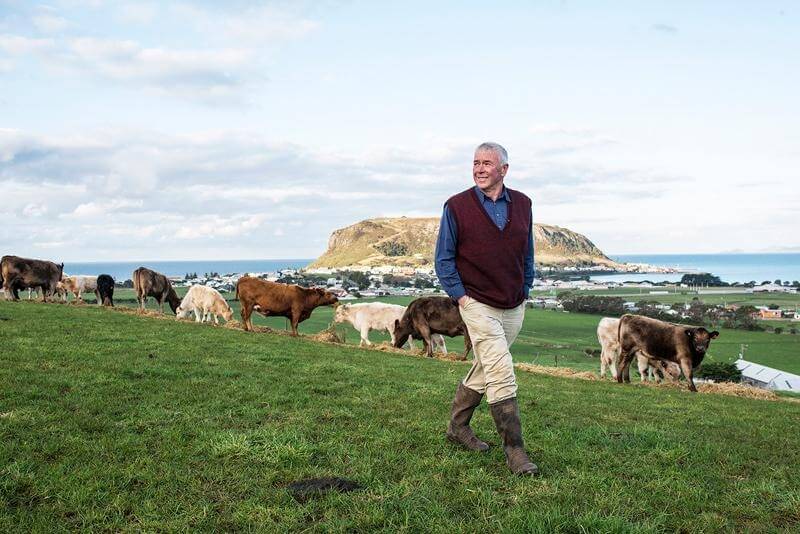
Why are nutrition, the environment and animal welfare so important to educate your consumers on? And how do you reinforce this messaging when working with influencers?
Pete Maldonado: When it comes to our sourcing, specifically when we’re bringing animal proteins, those are the three main pillars that we’re looking at. We obviously want grass-fed, grass-finished beef or venison and pasture-raised turkey. That means you know it’s going to be free of antibiotics. And even though we don’t have “organic” on the label, we’re actually using organic turkey. That’s the nutritional aspect.
From the environmental aspect, it’s all about regenerative agriculture. Let’s take beef, for instance. One of the things that we look at is how the animals are raised and if there is rotational grazing taking place on these cattle ranches. If you could imagine an average cattle ranch, it might be a thousand acres. What will happen is that farmers will actually break up a thousand acres into ten 100-acre paddocks — basically just a fenced-off area. Farmers set the herd of cattle in one paddock for a certain number of days or a certain time. Once they’ve eaten enough grass down to a certain level, they’ll open the door to the next paddock and let them go over there. That’s the basic gist of it. But the science behind it centers on the amount of time that you allow the animals to stay in each paddock. How much time do they need to wait before they can return to the original paddock?
You need to be able to find that perfect amount of time to allow the grasslands to regenerate and grow. There is a science behind that, and we follow all that from the Savory Institutes. If people are looking to get more education around that topic, that’s actually one of the sources that we’ve always used. They actually provide certification; a lot of the producers that we use will get their certifications through Savory Institute.
Some of the things that we’re working on right now is making sure that all of our suppliers actually have the land-to-market certification. The last piece is going to be animal welfare. I don’t know of another meat snacks company that’s using certified humane beef, but we are. And that was a big one for us and a great certification — the audit was pretty intense. But we were able to get all of our beef certified humane, which is amazing.
Find Passionate Influencers in Your Niche
Perlu: Does rotational grazing affect the taste of the meat and the health of the animal?
Pete Maldonado: Well, there’s a couple things. For one, you always want to keep your animals healthy and happy. A healthy animal is going to be a happy animal. If you’re allowing these animals to graze like they would in the wild, then they’re going to be extra happy. Being stuck in a feedlot with a bunch of other animals eating out of these troughs of food, pinned up against a bunch of other animals, you end up getting sick. That’s when you end up having to use a bunch of antibiotics and pump these animals up to keep them healthy.
When we go into a processing facility and you actually look at the animals’ carcasses, you can tell very clearly when there was an animal that was stressed versus an animal that was happy. On an animal that was stressed, the meat will have a different color. It actually has this weird purplish color because there was an excessive amount of lactic acid buildup in their muscles, and that’ll happen when the animals get overly stressed.
Part of the certified humane certification is making sure that the animals aren’t overly stressed in any part of the process, from day one to transport. Some farms might be a breeder where they start the animals very young before they go over to another farm where they actually live most of their lives before going to the finishers. The finishers are actually where they spend the last few months of their lives, basically eating a lot of very good, healthy grass. Every step of the way, it’s all about making sure that these animals are staying happy and treated humanely.
Perlu: Could you tell me how you guys go about reinforcing that messaging when you’re working with influencers?
Jodie Lyons: Sure. I can speak to that. All of these things are reasons that we believe in the brand ourselves, but that message is never going to be absorbed from someone who doesn’t believe in our brand already. Like I was saying earlier, something that is so important to us, especially when we’re talking about a lot of these educational components, is that we’re working with influencer partners who truly believe in our mission — who truly believe in our brand. They’re a true brand fan, and they align with our mission, and they have an audience already that’s interested in the types of practices that we do here at CHOMPS.
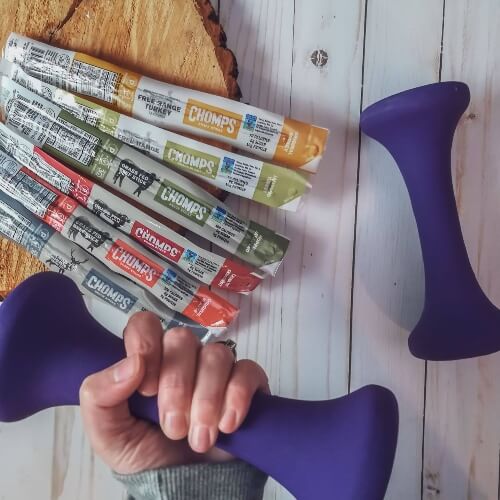 And that’s because nobody wants to look at influencer content that is clearly taking bullet points out of a brief, copying and pasting it into a caption. It just doesn’t feel authentic. When we bring on a new relationship, we make sure that they’ve had a chance to try the brand, that they truly believe in it, that they themselves are educated on our practices: sustainability, humanity, animal treatment, what ingredients are in our products. Because if the influencer believes in that and they’re educated on it, it’s going to come across so much more authentic and genuine in their content.
And that’s because nobody wants to look at influencer content that is clearly taking bullet points out of a brief, copying and pasting it into a caption. It just doesn’t feel authentic. When we bring on a new relationship, we make sure that they’ve had a chance to try the brand, that they truly believe in it, that they themselves are educated on our practices: sustainability, humanity, animal treatment, what ingredients are in our products. Because if the influencer believes in that and they’re educated on it, it’s going to come across so much more authentic and genuine in their content.
Something else that’s really important to us is: 1) having the influencer believe in the brand, and 2) working with them on an individual basis to choose the messaging points that are going to feel natural to them, make sense on their feed or be things that their audience is interested in. Instead of creating one campaign where everybody has to hit on this one specific message, the content is so much more exciting for everybody to engage with if it’s been done in a true collaboration with the influencer partner where they know they’re talking about things they believe in — that they think their audience is going to be really excited about.
And that also ensures that all the content we put out there with our partners feels a little bit different versus filling up the feed with the same message over and over and over again. There is some of that repetition, of course, because we want to reinforce all these exciting things that we’re doing here at CHOMPS. But being able to individualize and customize that message based on what’s important to that influencer partner makes for so much more exciting and believable, interesting content.
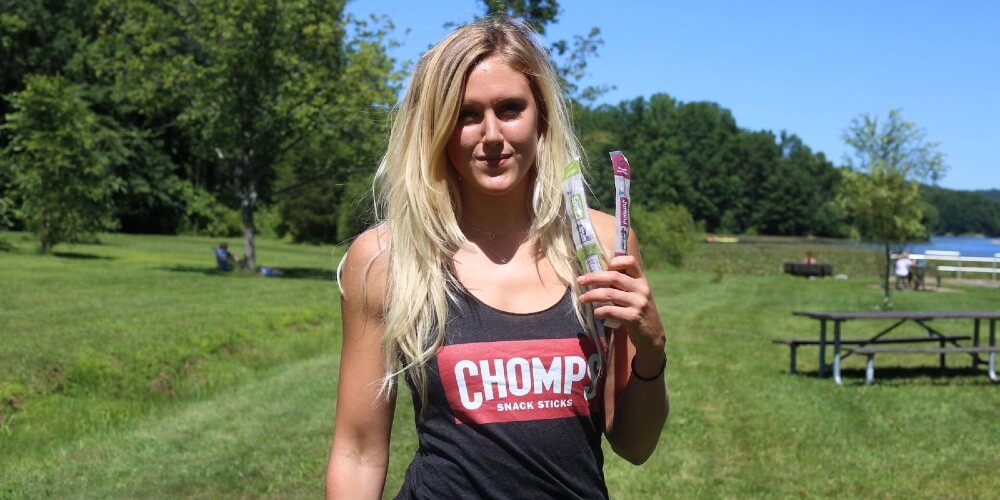
Perlu: And is it likely that a lot of these influencers already know a lot of the facts that Pete just mentioned, and they’re already writing about a lot of that anyway? So there’s very little that has to go toward the influencer.
Jodie Lyons: Oh, for sure. An example I can give is on the nutrition side of things. We partner with a variety of influencers across a variety of different diet groups: the Whole30 community, the paleo community, the keto community, the allergen community and the AIP community. There’s so many different types of people who rely on CHOMPS to fill their various diet needs. So a lot of these influencers that we work with may fall into one of these different diets segments.
Their audience is already so interested in the keto diet, for example. They’re following influencers who are educating them about why they believe in this diet, why it’s the right fit for them and what it’s doing for their bodies. That means when we ask them if they would like to partner with our brand and find a way that we can organically bring a partnership together, we already know their audience either knows or believes in some of the nutritional benefits of our product, and they’re recommending a product that’s already going to fit into their audiences lifestyle.
Sometimes there is less of that education component where this is brand new information that their audience is getting. Their audience might already know this, and that means when we bring our product in front of them, we can say, “This hits on all of these items that you already believe in and it’s why we believe this would be a great thing to put in your pantry.”
Read More About How Influencer Marketing is Broken and How to Fix It
Perlu: Awesome. I love hearing about how CHOMPS is not only good for you but it’s good for the environment and for animal welfare. Let’s switch gears here.
Could you tell us what kinds of changes you guys are seeing in sales during the COVID-19 pandemic right now?
I know a lot of companies are struggling, and consumers should be spending money with the small businesses and helping them through these trying times. So could you tell us what kinds of changes you guys are seeing?
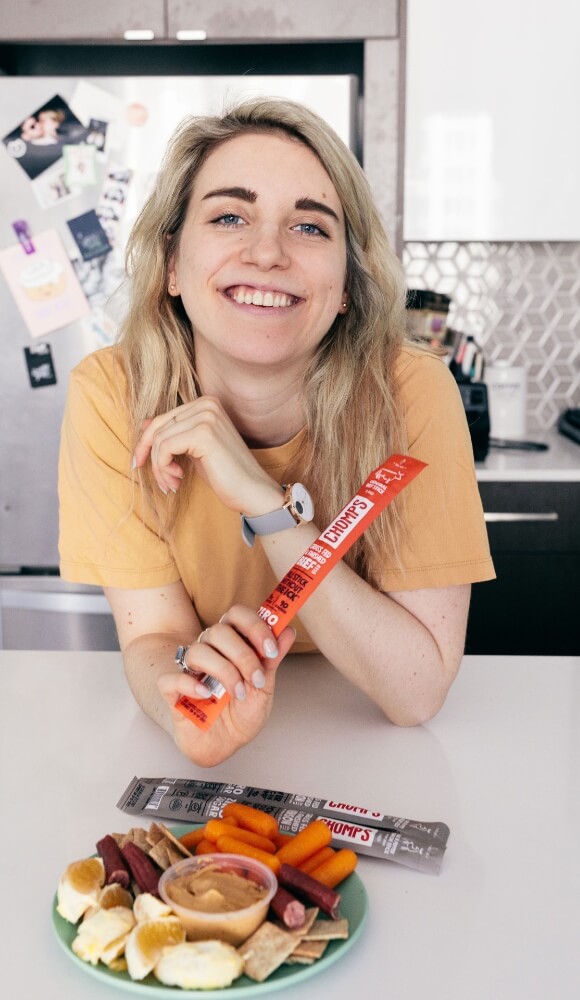 Pete Maldonado: Yeah, I could speak to that. So when things were first announced that there was going to be this Shelter-in-Place set up, a massive surge started with e-commerce, so Amazon and our website were just on fire. And then that surge carried right over into retail as well. I think overall demand is still there. That surge has probably pulled back a decent amount, and I think people stocked up pretty early on and then pulled back.
Pete Maldonado: Yeah, I could speak to that. So when things were first announced that there was going to be this Shelter-in-Place set up, a massive surge started with e-commerce, so Amazon and our website were just on fire. And then that surge carried right over into retail as well. I think overall demand is still there. That surge has probably pulled back a decent amount, and I think people stocked up pretty early on and then pulled back.
Our business has been growing pretty steady year over year, so it’s tough for us to tell what’s hanging around from that surge and if there are people who are just staying home and still trying to stock up on our products. Or is this just the normal growth curve that we were already on? We’re not quite sure yet. Time will tell, but yeah, we’re seeing it’s steady. And it’s been over a month since our numbers have been up across the board. So we’re very fortunate to have that when a bunch of other industries are being completely shattered right now.
Perlu: Do you attribute your growth to the direct-to-consumer approach you take?
Pete Maldonado: We’re best in class when it comes to the direct-to-consumer side of things, especially in the meat snacks category. I don’t know of another brand that really competes with us. We are able to really shift that focus and put some of the marketing dollars that we would have put towards growing the business and retail into marketing and digital and ecommerce. And that’s an easy shift for us to do — our team is so small and nimble. We’re a scrappy little bunch, and so we’ve always been doing a lot with a little. We’re always able to roll with the punches pretty easily on this and not skip a beat. We’ve always had work-from-home Fridays anyway, so we didn’t know it, but I guess we were gearing up for this.
What we did see though is a bottleneck in retail with some third parties that you rely on in order to get the product on the shelves. A lot of distributors were having issues. Their trucks were packed with the essentials. I mean, if they’re trying to keep up with the demand for toilet paper or milk bread and all the other essentials that people would be normally going to the grocery store for, there’s not a lot of room for snack products like CHOMPS. We’re just not going to make it to the top of that list. That’s really what happened, and we got cut off for a little bit. If it was sold out at a store, then it took weeks before it made it back on the shelves. That caused a little bit of a down tick in sales for us. But overall, the demand’s there, people are still looking for better-for-you, shelf-stable products like ours. Again, we’ve been fortunate to have no real decline in business.
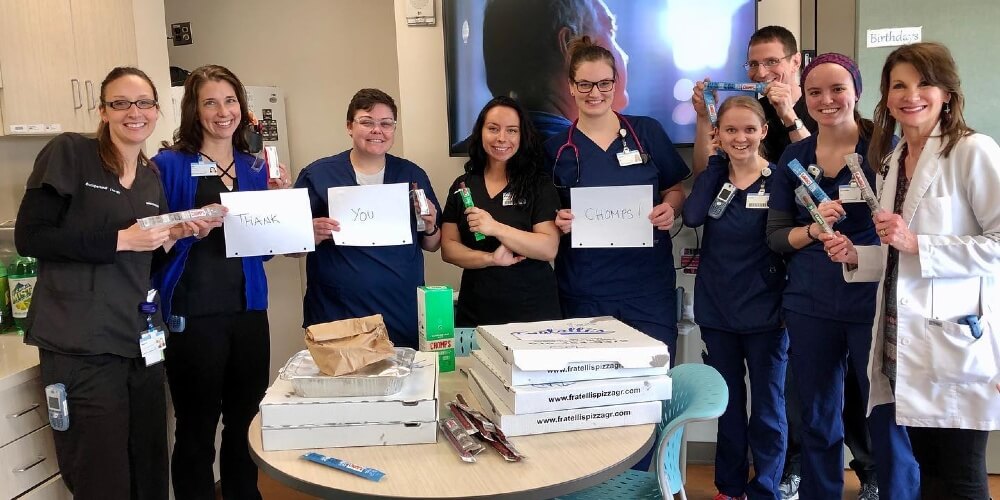
Perlu: How have you been engaging with influencers differently during this pandemic?
Jodie Lyons: It’s been incredibly important to us as a brand that we’re working with influencers on a case-by-case basis to ensure that the content we’re working with our partners on is self aware without leaning into fear or being self serving for our brand. We’ve taken a really individualized case-by-case approach to work even more closely than we already do with our partners. We never want to force our messaging at a time where it feels like people don’t want to hear a branded sponsored message.
We’re lucky; with influencer marketing, a lot of people are spending time on social media, myself included, and influencer has been a place where we’ve heard from our own consumers. People are looking to influencers to get inspiration and get ideas on what types of food they can get their hands on, because not every brand is available online when a grocery store doesn’t have the items they need for their particular diet. It’s definitely been case by case — working with partners when they feel comfortable and customizing that message rather than using our own bullet points in terms of messaging. We work with that creator to give their audience what they’re asking for versus us asking the content creator to create what we are looking for.
Perlu: That’s awesome, and I think you really hit on a great point there that maybe what they’re looking for in stores is not available to them. Another great point that you hit on is that everyone is online right now. Everyone is desperate to connect with people, and so it really sounds like influencer marketing is the best approach for brands to be taking right now, considering that’s where people are and that’s what they want — that human connection.
Jodie Lyons: I believe so. I think something that us as a team at CHOMPS talked about at the very beginning — about a month ago when all of this started becoming very real — is that the last thing we want to do is have our logo talk to a sea of people with so much noise on social media. I think people are creating humanity now more than ever. Partnering with an influencer who has a face who can speak to that has been incredibly impactful on a human level — a way for us to get out from behind the logo and put a face on our brand through our partnerships, building that trust between audience and brand.
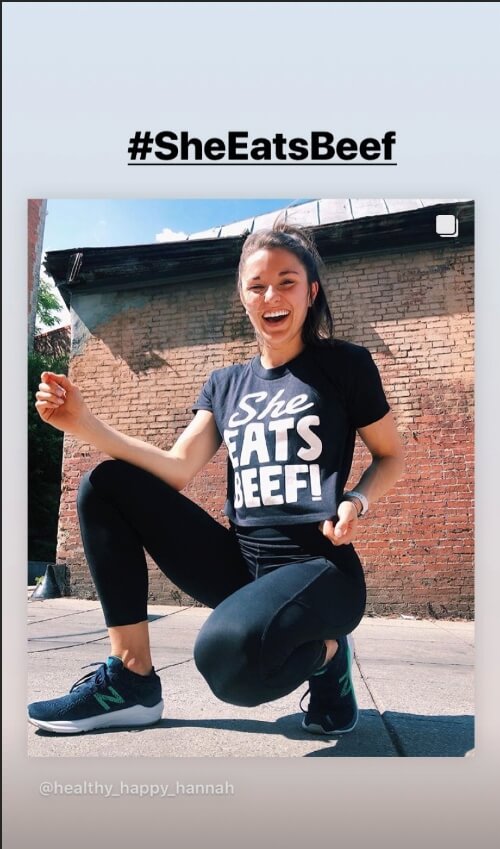 One thing that we’ve done that we haven’t done before is Instagram Live. I think people are creating that real-time connection when they can’t get it, when they’re spending so much time inside. We’ve leveraged a couple of our long-standing relationships to think about how we can put out more live content so people feel like they can talk about the things that matter most to them. There are plenty of people out there looking to uphold their keto diet or participate in the Whole30 that’s going on. We thought a great deal and talked as a team about how we go about putting our messaging out there.
One thing that we’ve done that we haven’t done before is Instagram Live. I think people are creating that real-time connection when they can’t get it, when they’re spending so much time inside. We’ve leveraged a couple of our long-standing relationships to think about how we can put out more live content so people feel like they can talk about the things that matter most to them. There are plenty of people out there looking to uphold their keto diet or participate in the Whole30 that’s going on. We thought a great deal and talked as a team about how we go about putting our messaging out there.
We don’t just want to seem like a brand who’s just trying to sell in the midst of a crisis. But what we heard from a lot of our audience and from our influencer partners is that people are still looking for these options — for these lifestyles that they uphold. We have to get out there and tell them that they can get it delivered straight to their door if the local grocery store is out of stock. You can still stick to your values and lifestyle by finding options like ours.
Perlu: Absolutely. I know that at-home workout programs right now are booming, and I know that while sitting at my house right now, social distancing, I’m eating a lot more than usual, but I can still eat healthy things.
Jodie Lyons: For sure. And there are so many people who are self-aware in the sense that “I am snacking more right now. I want to be able to grab snacks that I can feel really good about.” So as I said earlier, that type of messaging comes from that natural conversation — that close partnership that we’re having with the influencers we work with. Often, we let the influencer bring that to us. If they’re saying “My audience knows they’re snacking a lot, but they want to find cleaner snacks,” then we collaborate with that influencer to put the right message out there versus using an angle that we want to push ourselves. But naturally, that’s what we’re hearing from a lot of our partners: people still want to find snacks that they can feel really good about, even in the midst of everything going on right now.
Pete Maldonado: One other thing that we’re doing now is using influencers to promote some of our fundraising opportunities that we’ve got going on. For one campaign, we’ve teamed up with O2. It’s a recovery drink, and they’re really big within the CrossFit space as well. And we got our start in that CrossFit space. One of the things that we’re doing is forming this community coalition, and they’re partnering with various brands like ourselves. We’re offering the gyms a way to offer our products to their members. And then we’re doing a profit-sharing model with the actual gym.
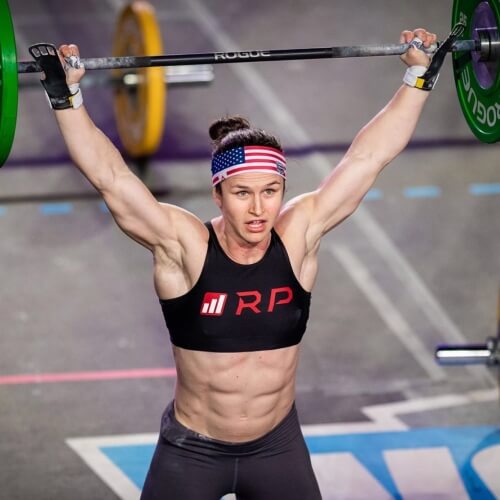 It’s a risk-free way for the gym to generate some revenue in a time where the gyms are shut down. I mean, they’re struggling. It’s a way for the members to buy the products that they’d probably be buying anyway, but they’re able to support the gym at the same time. We actually just kicked this thing off this past week, and we’re leveraging influencers. So Kari Pearce is a big CrossFit athlete. I don’t know if you’ve ever heard of her, but she’s the Fittest American Woman. And she’s amazing. She has a huge following, and she’ll be promoting this as well.
It’s a risk-free way for the gym to generate some revenue in a time where the gyms are shut down. I mean, they’re struggling. It’s a way for the members to buy the products that they’d probably be buying anyway, but they’re able to support the gym at the same time. We actually just kicked this thing off this past week, and we’re leveraging influencers. So Kari Pearce is a big CrossFit athlete. I don’t know if you’ve ever heard of her, but she’s the Fittest American Woman. And she’s amazing. She has a huge following, and she’ll be promoting this as well.
And we’re giving back; it’s a 50/50 profit-sharing split. That’s a big chunk of change for small brands like ours to be giving back to the gyms. But again, we’re so fortunate right now. We know that during a time like this, industries like gyms that are just beyond struggling, so we’re ready to step in and help them out as much as we can.
Perlu: That’s amazing. That’s wonderful of you all.
What advice do you have for other family-owned businesses during a time like this?
Pete Maldonado: Prioritize that human element, and speak to your audience and put yourselves in their shoes. If you’re not able to be empathetic, and all you’re worrying about is building your brand and you can’t even put yourself in other people’s shoes, you’re going to struggle. It annoys me when I see brands do that. I’m not going to run our business like that. Prioritizing the human element is the way we’ve always done things; you have to have some level of empathy. And then the other thing is, at a time like this, take care of your own employees. I think that’s critical too.
Perlu: Definitely. Well, thank you both so much for joining me today.
Thank you so much to everyone listening. We hope you really enjoyed hearing from Pete Maldonado and Jodie Lyons at CHOMPS. If you like our show and are interested in what it takes to succeed in influencer marketing, we hope you subscribe to our podcast and leave us a review on Apple Podcasts, Google Podcasts, Spotify, Stitcher or wherever you listen to podcasts.
You can also check out our blog at blog.perlu.com for more podcasts and blog posts. If you haven’t yet, don’t forget to sign up for Perlu at perlu.com to meet, mingle, connect, collaborate, and grow your career. We hope you join us for our next installation of Perlu’s influencer marketing podcast, Influencer Marketing Reimagined.

